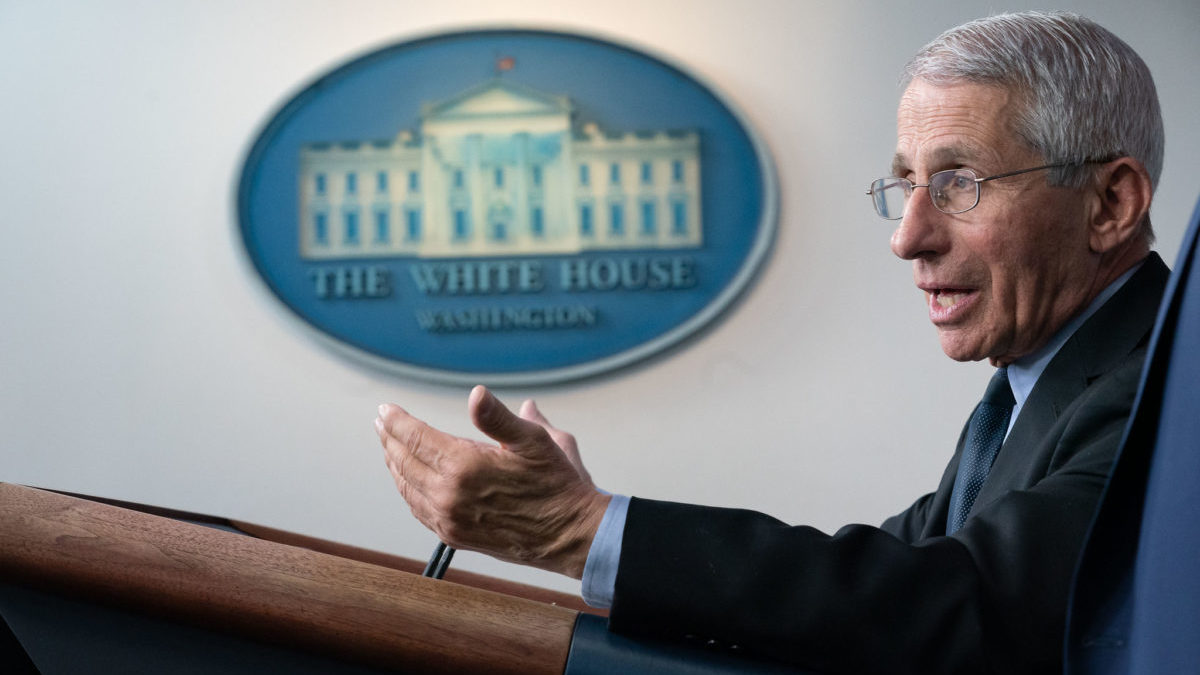Discussing new rules for risky virus research when they were finalized a few years ago, National Institute of Allergy and Infectious Diseases Director Anthony Fauci acknowledged, “I don’t think this is going to be foolproof, things are going to slip through.”
As senators sparred yet again with Fauci at a congressional hearing last week, he stated that his agency has followed the regulations for funding “gain of function” research, which can make certain viruses more deadly or transmissible. But he obfuscated how he played a role in creating those same regulations, which officials and some scientists say are too weak.
“The guide rails for what can be done were not established by me, they were by a three-year process led by the Office of Science and Technology at the White House,” Fauci said of gain-of-function research at the hearing.
After some high-profile lab accidents, in 2014 the U.S. government paused federal funding of gain-of-function research. In 2017, the research resumed under a new Potential Pandemic Pathogens Control and Oversight (P3CO) Framework, with a review committee established within the Health and Human Services Department (HHS) to oversee federal funding of such research.
But during those three years, with Fauci’s input, the review committee was stripped of its power to veto proposed research, as The Washington Post’s Pulitzer Prize-winning reporter David Willman and Madison Muller noted in an in-depth investigation last year. The definition of the research the panel reviews (the definition that Sen. Rand Paul, R-Ky., and other senators keep arguing about with Fauci) was also narrowed to exclude some potentially dangerous viruses.
Summarizing its findings on the research review committee, the Post says that both Fauci and then-director of the National Institutes of Health Francis Collins:
…in recent years have helped shape policy changes, directly and through their aides, that undercut the committee’s authority, according to federal documents, congressional testimony and interviews with dozens of present and former officials and science experts.
In 2017, a change made under their watch removed the committee’s power to block the [gain of function] projects, recasting the panel as strictly an advisory body.
Another change at that time redefined gain-of-function research, giving NIH leaders greater leeway to approve projects without referring them to the review committee. Some researchers had complained that far-reaching reviews would slow NIH approvals and scientific progress.
Since then, the experiments have continued to unfold amid secrecy, and HHS, which administers the review committee, has kept its work confidential…
In an interview for this report, both Collins and Fauci and their senior aides disputed that the policy changes had weakened oversight of the research.
Committee Members Say They Lack Power
A member of the grant review committee has said the definition of the research the committee reviews needs broadening. Another member told the Post that from 2017 to 2020, no more than “three or four” projects were forwarded to the review committee. “They were grading their own homework,” said Robert Kadlec, who also served as the Trump administration’s assistant HHS secretary for preparedness and response.
Twenty-one gain-of-function grants were halted during the 2014-2017 period, but ten were allowed to proceed with exceptions, Collins told The New York Times in 2017 — signaling that fewer grants have been defined as gain of function since then.
Washington Post columnist Josh Rogin has described Fauci’s role in gain-of-function research thus: “The head of the entire field really is Anthony Fauci — he’s the godfather of gain-of-function research as we know it,” Rogin told “The Megyn Kelly Show” in April 2021. The National Institutes of Allergy and Infectious Diseases (NIAID) Fauci currently leads had a $6 billion budget in 2021.
A good question for Fauci would be: Is “three or four” grants being forwarded to the review committee from 2017 to 2020 accurate, and is it enough? Were all approved and funded? In an exchange with Fauci, Paul stated “the committee has granted every exemption.” An NIH spokesperson has said the agency doesn’t discuss unfunded grant applications, which avoids providing information on rejection rates.
U.S. Grant to Wuhan Slipped Through Review Process
An example of a grant the committee did not review is one that sent U.S. taxpayer money to the Wuhan Institute of Virology, which is considered a possible origin of Covid-19. The NIH has said its grant to the EcoHealth Alliance for bat-based coronavirus research did not meet the definition of gain of function and thus was not submitted to the committee.
The EcoHealth grant was originally approved during the 2014-2017 “pause,” before the review committee process was created. The head of EcoHealth referred in 2016 to the research as “gain of function” and the NIAID program official who oversaw the grant flagged it as possibly meeting that definition.
EcoHealth convinced NIAID its research was not gain of function in part because the virus being studied “has never been demonstrated to infect humans or cause human disease.” Yet months earlier, the virus had been shown in other research to do just that. The purpose of the grant was also to study which bat viruses might easily spread to humans.
More questions for Fauci: How did NIAID determine that the EcoHealth research was not meeting their definition of gain of function? How could the possible evolution of those viruses be studied without making them more transmissible among humans, which would make them gain of function research? How well did NIH oversee the total of ten gain-of-function grants it exempted during the pause, and are any ongoing?
Fauci, Should the Government’s Definition Change?
Yet more questions for Fauci: Is the government’s definition of “gain of function” research too narrow? Did he and does he still support the changes made to it back in 2017?
The 2014 government definition referred to pathogens “transmissible among mammals” that might accidentally cause human infections. It was narrowed in December 2017 to cover viruses “likely capable of wide and uncontrollable spread in human populations.”
If the definition had remained as the original, would the EcoHealth project have been reviewed by the committee?
Too Many Exemptions for Such Research?
Does Fauci support the other exemptions for committee review, such as for research that involves “naturally occurring pathogens that are circulating in or have been recovered from nature, regardless of their pandemic potential”? Would this have also exempted the EcoHealth grant from review?
Does Fauci agree that “Activities associated with developing and producing vaccines, such as generation of high growth strains” should be exempt from the review as gain of function?
As Rutgers University professor of chemical biology Richard H. Ebright told the Daily Caller News Foundation, referring to the exemptions in the review framework, NIAID and the NIH have “systematically thwarted — indeed systematically nullified — the HHS P3CO Framework by declining to flag and forward proposals for review.”
When Did Fauci Know About Lax Lab Security?
Also, when and how did Fauci learn of security concerns at the Wuhan Institute of Virology? Fauci’s agency had its own official in Beijing who had visited the Wuhan lab in 2017.
Dr. Ping Chen, the director of the NIAID office in China located in the U.S. embassy in Beijing, “visited the WIV [Wuhan Institute of Virology] in 2017 and co-wrote one of the 2018 State Department cables from the U.S. Embassy in Beijing on the WIV that highlighted concerns there” about lab security, according to House Energy and Commerce Committee Republicans.
Whom at NIAID was notified of Chen’s warning and how did such persons follow up? How does Fauci believe the research grant approval process needs to be improved so U.S. taxpayer money does not go to a lab with known security lapses?
Action and Legislation Addressing Gain of Function
Several bills are working their way through Congress, having passed in the House or Senate, restricting future U.S. funding toward the Wuhan Institute of Virology or gain-of-function research in China or other adversarial nations. The National Defense Authorization Act, which became law in December, bans EcoHealth from receiving any Department of Defense funding for research “in China on research supported by the government of China.”
Collins said in an interview in December, before he retired, that he expects current NIH policy on gain-of-function research will be revisited “in the coming months” by the National Science Advisory Board for Biosecurity.
NIAID and EcoHealth Alliance could not be reached for comment by publication time.









